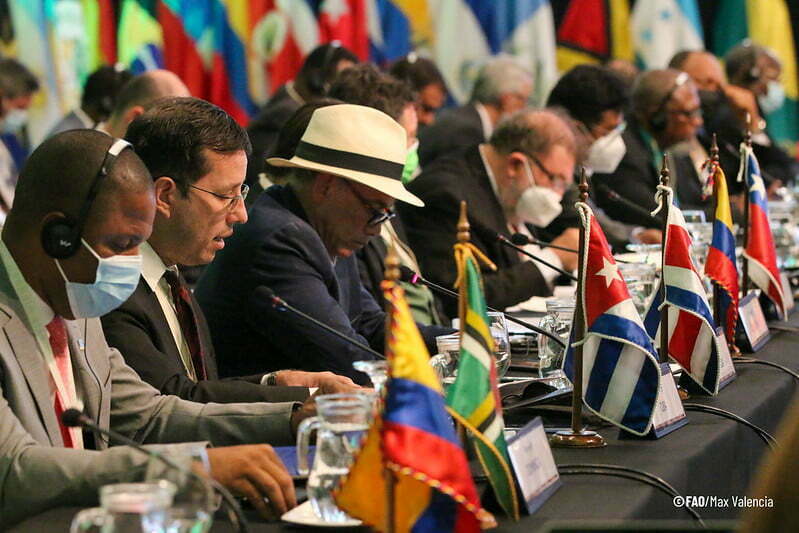the 37th FAO Regional Conference for Latin America and the Caribbean in Quito, the capital of Ecuador. After several days of analysis and debate on the work carried out over the last two years by the Food and Agriculture Organization of the United Nations (FAO), delegates from the 33 member states identified the priorities of the work plan for the period 2020-2030 and presented innovative experiences.
The event was preceded by 36 consultations at national, subregional and regional levels, involving thousands of people from governments and parliaments, civil society, the private sector, the scientific and academic community and United Nations teams. All with the aim of stimulating a deep and massive debate on a central issue for the present and the future.
In a complex Latin American and Caribbean economic, political and social context, exacerbated by the Covid-19 pandemic, the agri-food sector seems to be the key to solving the regional humanitarian crisis. For this reason, the event wanted to raise awareness of the need to transform every agricultural system and production mechanism according to the needs and capacities of each country. Always on the line of sustainability and internalizing the consequences of climate change.
During the conference, they also discussed the rise in food and fertilizer prices, advocated the development of efficient and innovative strategies that will allow the region to consolidate as the world’s largest food exporter, and called for the strengthening of school feeding programs and social protections in the face of the skyrocketing increases in hunger and obesity.
The Director General of the FAO, Mr. Qu Dongyu, in his statement acknowledged FAO’s concerns about the lack of food security guarantees and warned that the number of undernourished people worldwide could rise to between 7.8 million and 13.1 million. The official advocated peace and dialogue among the region’s nations as the only way to establish solid mechanisms to deal with the crisis. He also called on all countries to keep world trade in food and fertilizer open, find new food suppliers and diversity and endangered support groups, avoid ad hoc policy responses, and improve transparency and understanding.
Qu Dongyu acknowledged in his report that the strategic framework FAO is responding to the challenges of their current agri-food systems through a concerted and systemic approach based on the quest to achieve better production, better nutrition and better lives for all. Improvements that he believes reflect the links between and their central importance in relation to the economic, social and environmental dimensions of agri-food systems and rural development 2030 Agenda for Sustainable Development.
Participation of Cuba in LARC 37
During the conference, FAO Director-General Qu Dongyu and members of the Cuban delegation held a meeting where the country reaffirmed its commitment to promoting the transformation of agri-food systems to make them more efficient, inclusive, resilient and sustainable.
At the meeting, the director of the international organization paid tribute to the work of the FAO in the Antilles nation. He also highlighted the progress made in the Cuban agri-food sector, such as the implementation of the 63 approved measures to increase food production and the Food Sovereignty and Nutrition Education Plan.
FAO contributed to the development of the latter with technical assistance and financial support from the program “Impact, Resilience, Sustainability and Transformation of Food and Nutrition Security” (FIRST), funded by the European Union. Approved in 2020, the SAN plan has four priority lines, including promoting local food production.

the Minister of Agriculture, Ydael Perez Britoused the meeting to highlight FAO’s contribution to the plan and also to the Food Sovereignty and Food Security Act due to be passed this year.
FAO in Cuba works in accordance with Cuban policies and the Organization’s Strategic Framework (2022-2031) to achieve better production, better nutrition, a better environment and a better life; said Perez Brito.
On the other hand, on the fourth day of LARC37 meetings, the Cuban delegation shared their positive experiences in combating climate change and protecting the environment, both of which have an impact on national food production. In his speech, the Cuban President said, Miguel Diaz-Canel Bermudezhighlighted the FAO’s support to these areas of national interest through the project “Increasing the Climate Resilience of Rural Households and Communities through the Rehabilitation of Productive Landscapes in Selected Localities of the Republic of Cuba” (IRES), funded for the first time by Green Climate Funds in the country.
He also stressed the role of Cuban science in studying the effects of climate on agriculture, livestock, forestry and fisheries. As a country experience in this sense, he highlighted the state plan to combat climate change, known as a life’s work.On the Cuban side, combating climate change, increasing resilience and strengthening disaster risk reduction management in productive landscapes are goals that have the Supporting public policy and international cooperation of the European Union, the Green Climate Fund and Global Environment Facility.
Addressing climate change, increasing resilience and strengthening disaster risk reduction management in productive landscapes have also been identified as priority areas for Cuba by the FAO, goals supported by public policy and cooperation from the European Union, the Green Climate Fund and the Global become an environmental facility.

